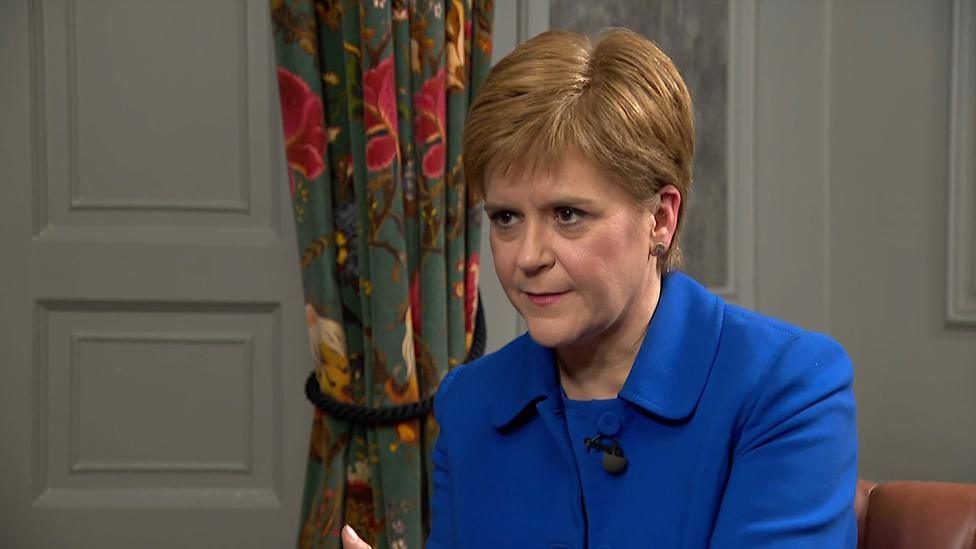General election 2019: Nicola Sturgeon interview fact-checked
- Published
Nicola Sturgeon talks to the BBC's Andrew Neil
Nicola Sturgeon, the Scottish first minister and SNP leader, was the first party leader to face the BBC's Andrew Neil in a series of special interviews in the run-up to the election.
During the half-hour interview, she was quizzed on her party's policies and record. BBC Reality Check has looked at three of her claims.
Claim: "Almost all of the polls show increasing support for Scottish independence"
Reality Check: According to the polling data collected by What Scotland Thinks, there has been an increase in support for independence if a second referendum were held now.
Excluding "don't knows", the average of polls this year has been 51% for No to 49% for Yes - extremely close but still marginal support for remaining in the union.
The average for 2018 was 55% to 45% - approximately the same as the result of the 2014 referendum.
Claim: "It is not true to say Scotland would have to have established an independent currency before joining the EU"
Reality Check: It is hard to say at this stage what would happen if an independent Scotland didn't have its own independent currency and wanted to join the EU. There is no precedent for it.
The EU rules for countries which want to join the EU, external do not explicitly say that a country has to have its own currency before it is allowed to become a member but all the countries which have joined the EU had their own currency at the time.
However, any new EU country is obliged to commit in principle to joining the euro, the EU's official currency, when it meets certain criteria. This implies that the country has to have an independent central bank. Before the 2014 Scottish referendum a former EU economics chief said that continuing to use the pound without a formal currency union with the UK could prevent an independent Scotland from joining the EU.
But the SNP has said an independent Scotland would not want to join the euro.
There is no mechanism by which the EU could force any of its member states to join the euro. The UK and Denmark are the only EU countries which have an opt-out from the euro, but Sweden, a country which meets the criteria, has also resisted becoming a member of Eurozone after voters rejected the idea in a referendum.
A country which wants to join the EU has to comply with all the other EU's standards and rules, it has to have stable institutions guaranteeing democracy, the rule of law, human rights and protection of minorities and a functioning market economy.
Once a country meets all the criteria, the EU institutions and EU member states as well as the citizens of the country in question - through a referendum or approval by a national parliament - have to consent to the accession. The final decision is therefore based on the political will of all the member states to admit a new country to the bloc.
Claim: "On seven out of the eight key NHS waiting times targets... there are now more people being seen within those targets than was the case in the year before"
Reality Check: Ms Sturgeon was challenged on NHS waiting times in Scotland under her government.
Ms Sturgeon pointed to a recent report that she said showed more people are being seen within target waiting times than before.
This is true - but is only part of the story.
The Audit Scotland report, external Ms Sturgeon was referring to did find that the number of people seen on time went up.
But that is because the demand was higher - so there were more patients overall. If you look at the percentage of patients seen on time, it actually went down for five out of eight patient categories from the previous year, external. It's worth noting that in three categories - one improved, two not - the percentage difference was less than 1%. So the improvement in drug waiting times of 0.1%, for example, only affected 44 people.
And the actual targets were only hit in two out of eight categories - patients starting cancer treatment within 31 days of a decision being made on their treatment, and drug and alcohol patients being seen within three weeks.

Ms Sturgeon also said that A&E waiting times in Scotland are "way ahead" of the performance in other parts of the UK. It's true that Scotland performs better than England on this metric - but it is still missing its targets.

- Published25 November 2019
